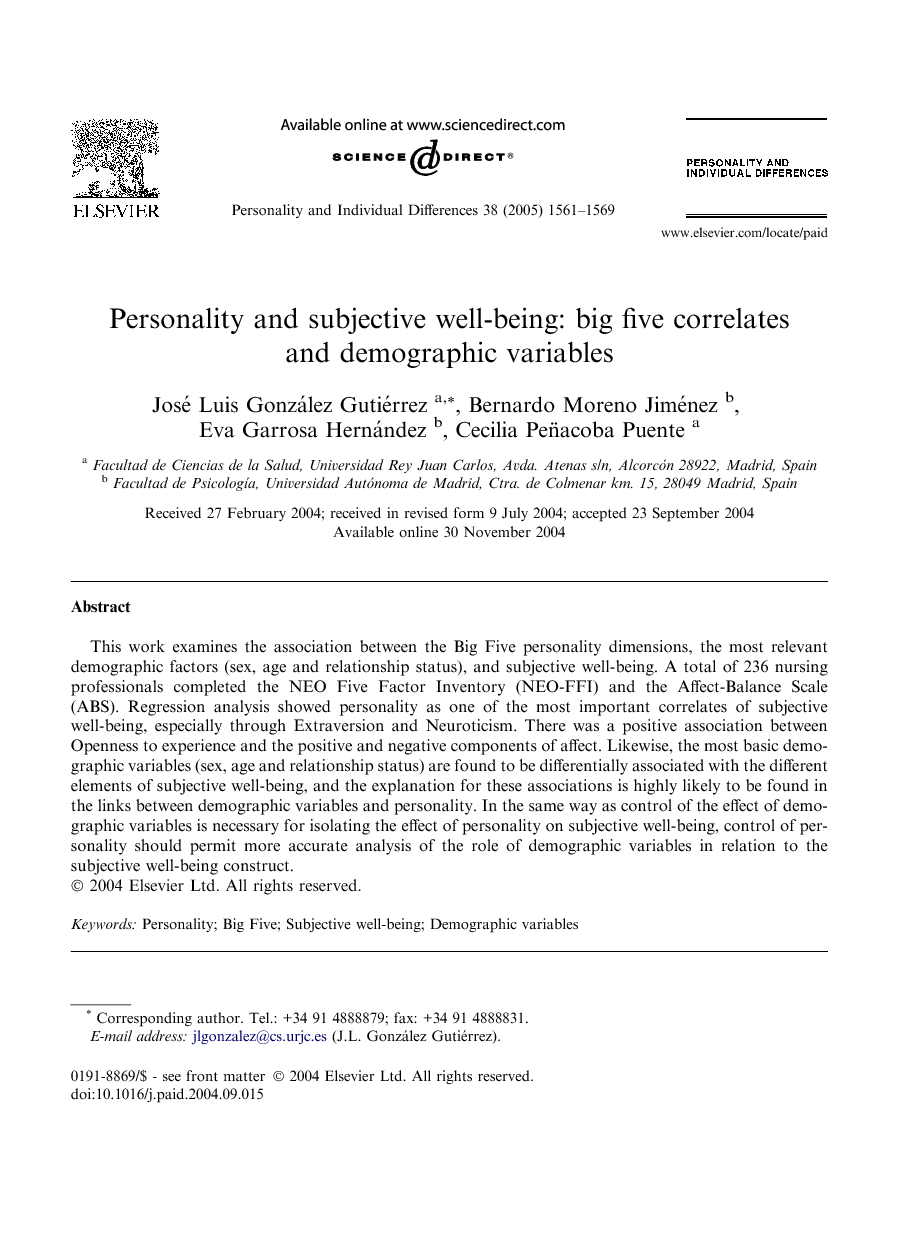This work examines the association between the Big Five personality dimensions, the most relevant demographic factors (sex, age and relationship status), and subjective well-being. A total of 236 nursing professionals completed the NEO Five Factor Inventory (NEO-FFI) and the Affect-Balance Scale (ABS). Regression analysis showed personality as one of the most important correlates of subjective well-being, especially through Extraversion and Neuroticism. There was a positive association between Openness to experience and the positive and negative components of affect. Likewise, the most basic demographic variables (sex, age and relationship status) are found to be differentially associated with the different elements of subjective well-being, and the explanation for these associations is highly likely to be found in the links between demographic variables and personality. In the same way as control of the effect of demographic variables is necessary for isolating the effect of personality on subjective well-being, control of personality should permit more accurate analysis of the role of demographic variables in relation to the subjective well-being construct.
In the late 1990s, the meta-analysis by DeNeve and Cooper (1998) showed the existence of a large number of studies on the relationship between personality and the two dimensions of subjective well-being (Veenhoven, 1984): affective (positive affect, negative affect and the balance between them) and cognitive (life satisfaction). In terms of the Big Five dimensions, the above-mentioned study suggested Neuroticism as the most important predictor of negative affect and life satisfaction, while Extraversion and Agreeableness were identified as the dimensions with the greatest predictive capacity for positive affect. Responsibility has also been identified by some authors as a variable related to both positive affect and life satisfaction (Hayes & Joseph, 2003).
McCrae and Costa (1991) have suggested that Agreeableness and Conscientiousness would increase the probability of positive experiences in social and achievement situations, respectively, and this, in turn, is directly related to subjective well-being. On the other hand, Openness to experience should lead the person to experience both more positive emotional states and more negative ones. The same authors argue that Extraversion has an influence on positive affect, while Neuroticism influences negative affect. This has led them to assert that these two basic dimensions of personality lead to positive and negative affect, respectively (Costa and McRae, 1980 and McCrae and Costa, 1991).
Nevertheless, it would appear interesting to make a systematic analysis of the way personality is linked to the most relevant demographic factors (age, sex, relationship status, etc.) in relation to subjective well-being, given the possible existence of crossed effects between these elements (Charles, Reynolds, & Gatz, 2001). Although control of demographic variables in the study of the correlates between personality and subjective well-being has become standard practice (e.g., Hayes & Joseph, 2003), simultaneous control of both personality and demographics appears necessary in order to explore the associations between them in relation to subjective well-being. In this regard, contradictory findings in the relation between demographics and subjective well-being (e.g., Andrews and Withey, 1976, Stock et al., 1983, Acock and Hurlbert, 1993 and Ball and Robbins, 1986) may be due to the relationship of demographics with external third variables, among which personality seems especially relevant.
The aim of the present study is to analyze the correlates between the Big Five personality dimensions (Neuroticism, Extraversion, Openness to experience, Agreeableness and Conscientiousness) and the demographic variables most relevant to subjective well-being, systematically controlling and examining the associations between them.


